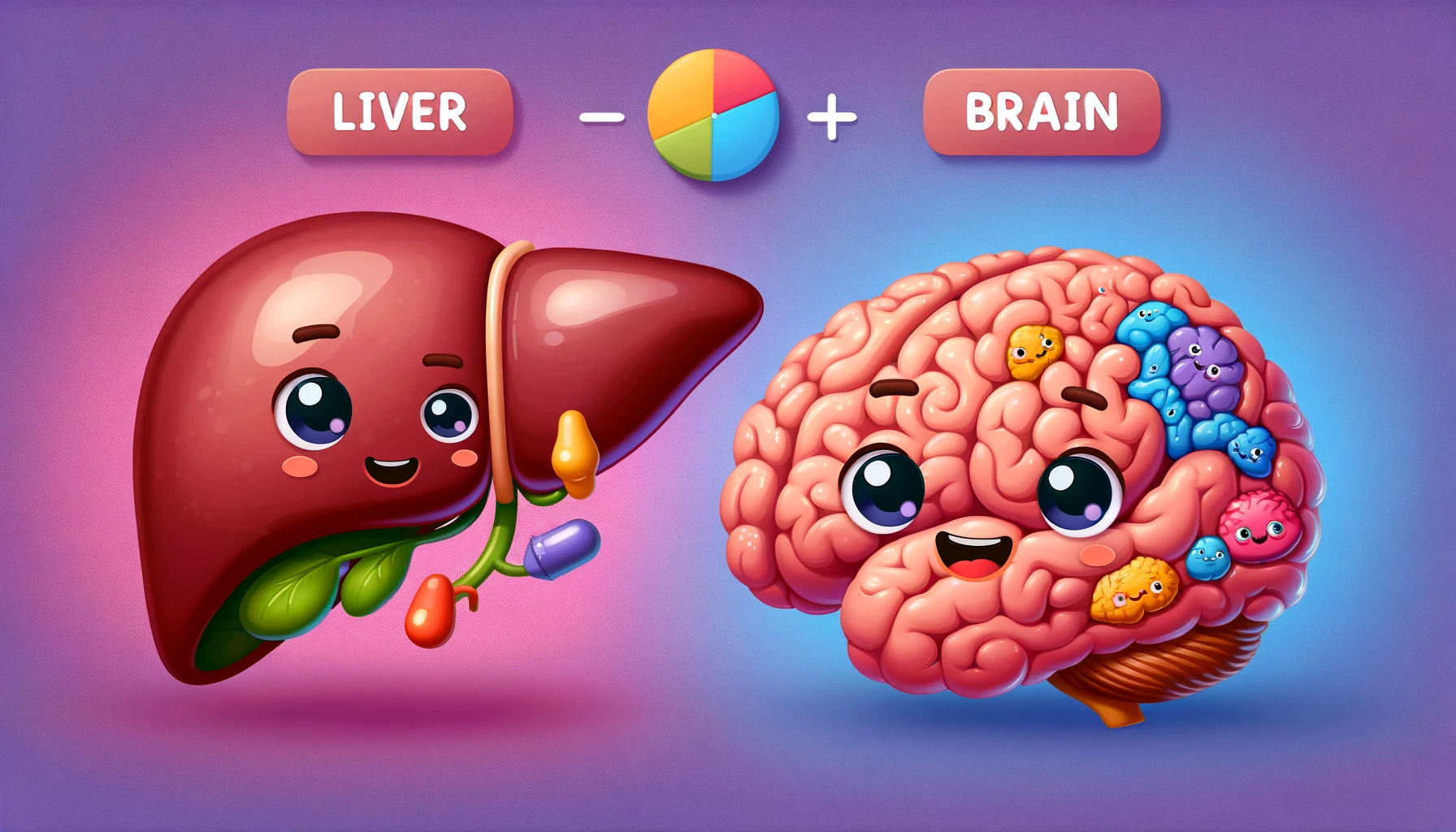Liver vs. Brain: Understanding Their Differences and Functions
Liver vs. Brain: Understanding Their Differences and Functions
Table of Contents
- Introduction to Liver and Brain
- Structure of the Liver
- Structure of the Brain
- Functions of the Liver
- Functions of the Brain
- Liver vs. Brain: Key Differences
- Common Liver Disorders
- Common Brain Disorders
- Importance of Liver and Brain Health
- Conclusion
- References
Liver vs. Brain: Understanding Their Differences and Functions
Introduction to Liver and Brain The liver and brain are two of the most vital organs in the human body, each playing crucial roles in maintaining overall health and functionality. While the liver is essential for metabolism and detoxification, the brain controls cognition, sensation, and motor functions. This article explores the differences and functions of the liver and brain, highlighting their importance in the body’s daily operations.
Structure of the Liver The liver is a large, reddish-brown organ located in the upper right abdomen, just below the diaphragm. Key structural features include:
- Lobes: The liver is divided into two main lobes, the right and left lobes, with the right lobe being larger.
- Hepatocytes: The main functional cells of the liver, responsible for various metabolic processes.
- Bile Ducts: Channels that transport bile produced by the liver to the gallbladder and small intestine.
- Blood Supply: The liver receives oxygenated blood from the hepatic artery and nutrient-rich blood from the portal vein.
Structure of the Brain The brain is a complex organ located within the skull, consisting of several key regions:
- Cerebrum: The largest part, divided into two hemispheres, responsible for higher brain functions such as thought, action, and sensory processing.
- Cerebellum: Located under the cerebrum, responsible for coordination and balance.
- Brainstem: Connects the brain to the spinal cord and controls involuntary functions such as breathing and heart rate.
- Lobes: The cerebrum is divided into four lobes – frontal, parietal, temporal, and occipital – each associated with different functions.
Functions of the Liver The liver performs several essential functions that are crucial for maintaining homeostasis:
- Metabolism of Nutrients: Processes carbohydrates, proteins, and fats absorbed from the digestive tract.
- Detoxification: Filters and detoxifies harmful substances from the blood, including drugs, alcohol, and environmental toxins.
- Bile Production: Produces bile, which aids in the digestion and absorption of fats.
- Storage: Stores glycogen (a form of glucose), vitamins, and minerals, releasing them into the bloodstream as needed.
- Synthesis of Proteins: Produces essential proteins, including albumin and blood clotting factors.
Functions of the Brain The brain controls and coordinates most activities of the body, including:
- Cognition and Perception: Involved in thinking, memory, decision-making, and interpreting sensory information.
- Movement: Controls voluntary movements through motor pathways.
- Regulation of Homeostasis: Maintains balance in the body by regulating temperature, hunger, thirst, and sleep.
- Emotion and Behavior: Processes and regulates emotions, mood, and behavior.
- Communication: Facilitates communication by processing and responding to external stimuli.
Liver vs. Brain: Key Differences
- Primary Function: The liver is primarily involved in metabolism and detoxification, while the brain is responsible for cognition, sensation, and motor functions.
- Structure: The liver is a large, glandular organ with lobes and hepatocytes, whereas the brain is a complex neural organ with distinct regions and lobes.
- Location: The liver is located in the upper right abdomen, while the brain is located within the skull.
- Processes: The liver engages in chemical processes like metabolism and detoxification, while the brain processes electrical and chemical signals to control body functions.
Common Liver Disorders Several disorders can affect the liver, leading to various symptoms and health issues:
- Hepatitis: Inflammation of the liver, often caused by viral infections, alcohol, or autoimmune conditions.
- Cirrhosis: Scarring of the liver tissue due to chronic liver damage, often resulting from long-term alcohol abuse, hepatitis, or fatty liver disease.
- Fatty Liver Disease: Accumulation of fat in liver cells, which can be alcohol-related (alcoholic fatty liver disease) or non-alcohol-related (non-alcoholic fatty liver disease).
- Liver Cancer: Malignant tumors in the liver, often associated with chronic liver disease or hepatitis infections.
Common Brain Disorders Several disorders can affect the brain, leading to various symptoms and health issues:
- Stroke: A condition where blood flow to a part of the brain is interrupted, causing brain cells to die.
- Alzheimer’s Disease: A progressive neurodegenerative disorder that affects memory, thinking, and behavior.
- Parkinson’s Disease: A neurodegenerative disorder affecting movement, causing tremors, stiffness, and balance problems.
- Brain Tumors: Abnormal growths in the brain that can be benign or malignant, affecting brain function depending on their location and size.
Importance of Liver and Brain Health Maintaining the health of both the liver and brain is essential for overall well-being:
- Healthy Diet: Consuming a balanced diet rich in fruits, vegetables, whole grains, and lean proteins supports both liver and brain health.
- Regular Exercise: Physical activity promotes overall health, improves circulation, and supports healthy liver and brain function.
- Avoiding Toxins: Limiting exposure to harmful substances like alcohol, drugs, and environmental toxins protects both the liver and brain.
- Mental Stimulation: Engaging in activities that challenge the brain, such as puzzles, reading, and learning new skills, supports cognitive health.
- Regular Check-ups: Routine medical check-ups can help detect and manage potential liver and brain issues early.
Conclusion Understanding the differences and functions of the liver and brain is crucial for maintaining overall health. By recognizing the unique roles these organs play in metabolism, detoxification, and cognition, and by adopting healthy lifestyle habits, individuals can support the optimal functioning of their liver and brain.
<ⓒ WizardMedics (wizardmedics.com)>







